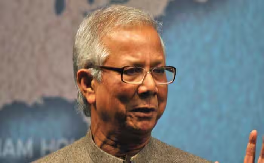Bangladesh’s Chief Adviser Muhammad Yunus has said the interim government would pursue with India ways to resolve the issues pertaining to the long-pending Teesta water sharing treaty. He emphasised that delaying it for years will not serve any purpose to both countries.
In an interview with PTI at his official residence in Dhaka, Yunus stated that the water-sharing issue between the two countries must be resolved according to international norms. He underlined that lower riparian countries like Bangladesh have specific rights that they seek to uphold.
“By sitting over this issue (water sharing), it is not serving any purpose. If I know how much water I will get, even if I am not happy and sign it, it would be better. This issue has to be resolved,” Yunus told PTI.
While responding to a query on whether the interim government would push for resolving the issues over the Teesta water-sharing treaty at the earliest, he said the new regime will pursue it. “Push is a big word; I am not saying it. We will pursue it. But we have to sit together and resolve it,” he said.
In 2011, India and Bangladesh were set to sign a deal on Teesta water sharing during then-Prime Minister Manmohan Singh’s visit to Dhaka, but West Bengal Chief Minister Mamata Banerjee declined to endorse it. She had cited the fear of scarcity of water in her state.
“This is not a new issue but a very old issue. We have spoken on this issue on several occasions. The discussions began during the period of Pakistan’s rule. While we all wanted this treaty to be finalised, even the Indian government was ready for it. However, the state government of West Bengal was not ready for it. We need to resolve it,” he said.
Yunus emphasised that lower riparian countries like Bangladesh have specific rights that they seek to uphold. “We have to resolve this issue according to international norms. The lower riparian countries have certain rights, and we want those rights,” he stated.
Speaking about the flood situation in Bangladesh and reports blaming India for the floods, Yunus said that until the treaty is signed, a humanitarian approach can be adopted to deal with such crises. “When the High Commissioner (of India) came to meet me, I said that we can work on better management to see how the situation can be controlled during the floods. For such coordination between two countries, we don’t need any treaty,” he said.
“We can work on this together on humanitarian grounds and resolve this, as this will ease the suffering of the masses. Such humanitarian steps would really help,” he further stated.
The remarks of the Bangladesh’s Chief Adviser come days after the interim government’s Adviser on Water Resources, Syeda Rizwana Hasan, told PTI that Dhaka would push for restarting the dialogue regarding the Teesta water-sharing treaty with New Delhi and emphasised that both countries should adhere to international principles regarding water-sharing.
Last month, Yunus, the 84-year-old economist, took oath as the interim government’s chief adviser. His oath came after former Bangladesh Prime Minister Sheikh Hasina tendered her resignation and arrived in India amid unrest triggered by protests over the jobs quota row.



